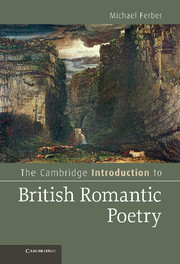Book contents
- Frontmatter
- Contents
- Preface
- Acknowledgments
- Chapter 1 Introduction
- Chapter 2 The poet
- Chapter 3 “Tintern Abbey”
- Chapter 4 Romantic odes
- Chapter 5 The French Revolution
- Chapter 6 Romantic sonnets
- Chapter 7 Romantic love lyrics
- Chapter 8 Romantic ballads
- Chapter 9 Romantic epics and romances
- Chapter 10 Romantic verse drama
- Chapter 11 Romantic satire
- Appendix
- Notes
- Further reading
- Index
Chapter 2 - The poet
Published online by Cambridge University Press: 05 June 2012
- Frontmatter
- Contents
- Preface
- Acknowledgments
- Chapter 1 Introduction
- Chapter 2 The poet
- Chapter 3 “Tintern Abbey”
- Chapter 4 Romantic odes
- Chapter 5 The French Revolution
- Chapter 6 Romantic sonnets
- Chapter 7 Romantic love lyrics
- Chapter 8 Romantic ballads
- Chapter 9 Romantic epics and romances
- Chapter 10 Romantic verse drama
- Chapter 11 Romantic satire
- Appendix
- Notes
- Further reading
- Index
Summary
No feature of Romanticism is more definitive than the glory it confers on the poet. He inherits the role of prophet, preacher, and priest from the receding Christian tradition; he is seen as the creator of imaginative worlds and national myths; he becomes a hero, almost a god. In the preface to the 1802 edition of Lyrical Ballads, Wordsworth writes that the poet
is the rock of defence of human nature; an upholder and preserver, carrying every where with him relationship and love. In spite of difference of soil and climate, of language and manners, of laws and customs, in spite of things silently gone out of mind and things violently destroyed, the Poet binds together by passion and knowledge the vast empire of human society, as it is spread over the whole earth, and over all time.
And that was putting it mildly. “Hear the voice of the Bard!” Blake demands, in the “Introduction” poem of the Songs of Experience (1794), “Who Present, Past, & Future sees / Whose ears have heard, / The Holy Word, / That walk’d among the ancient trees.” Shelley concludes A Defence of Poetry (written in 1821, but not published until 1839) with these justly famous words expressing how poets are the vehicles of the spirit of the age, and the age to come: “Poets are the hierophants of an unapprehended inspiration; the mirrors of the gigantic shadows which futurity casts upon the present; the words which express what they understand not; the trumpets which sing to battle, and feel not what they inspire; the influence which is moved not, but moves. Poets are the unacknowledged legislators of the world.”
- Type
- Chapter
- Information
- The Cambridge Introduction to British Romantic Poetry , pp. 16 - 40Publisher: Cambridge University PressPrint publication year: 2012

